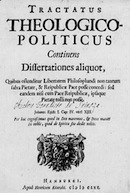
Source: Theologico-Political Treatise - Chapter IV - Of the Divine Law
Spinoza's Chapter 4. – Christ was different from the prophets (Page 6)

What he said of Adam and the Israelites under Moses Spinoza applies also to the prophets who wrote laws in the name of (Deus sive Natura). Spinoza writes, They did not adequately conceive of (Deus sive Natura)'s decrees as eternal truths.
They perceived religious decrees as precepts and ordinances, and conceived of the deity as a ruler, a legislator, a king, as merciful, just, &c., whereas such qualities are simply attributes of human nature, and utterly alien from the nature of the Deity.
Spinoza alluded to Christ in a previous section (see pg 102) but here he goes further and exempts him from his criticism of the prophets because although Christ also seems to have written laws in the name of the deity as the prophets did he must be taken to have had a clear and adequate perception, for Christ was not so much a prophet as the mouthpiece of God.
Continuing Spinoza's words, For God made revelations to mankind through Christ as He had before done through angels - that is, a created voice, visions, &c. It would be as unreasonable to say that God had accommodated his revelations to the opinions of Christ as that He had before accommodated them to the opinions of angels (that is, of a created voice or visions) as matters to be revealed to the prophets, a wholly absurd hypothesis. Moreover, Christ was sent to teach not only the Jews but the whole human race, and therefore it was not enough that His mind should be accommodated to the opinions the Jews alone, but also to the opinion and fundamental teaching common to the whole human race - in other words, to ideas universal and true. Inasmuch as God revealed Himself to Christ, or to Christ's mind immediately, and not as to the prophets through words and symbols,
Comment:
I have chosen to print Spinoza's comments on Christ and angels just as they appear in the text because I simply do not know what to make of them. I feel a shock of disbelief that my philosopher hero should so uncritically take the words of the New Testament as truth. He distinguishes between Christ and the prophets by saying that the prophets got their understanding of the deity through words and symbols whereas Christ perceived (truly and adequately) what was revealed. I do not understand on what Spinoza bases this. Is it possible that because his friends and contacts where mostly Christian he went easy on their Savior? Could my Baruch be so swayed? On the other hand was he, even he, a creature of his times? Was he so surrounded by Christianity that he could believe that Christ was indeed special - the mouthpiece of a god?
In addition Spinoza excuses Paul's attributions of justice, mercy, grace, anger, and similar qualities to the deity merely in concession to popular understanding, and as adapting his language to the popular mind.